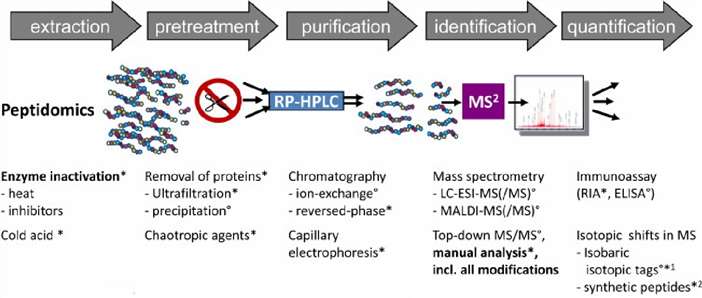Peptidomic Analysis Services
- Home
- Applications
- Proteomics Analysis Services
- Peptidomic Analysis Services
Service Details
Peptidomics is a relatively new and often overlooked branch of proteomics that targets biologically active substances involved in various cellular functions in an organism, including cytokines, growth hormones, and disease-specific proteins of certain proteins in body fluids. They are related to the regulation of organisms, including hormone regulation, neurotransmitter regulation, cell growth and proliferation regulation, and immune regulation. Studying the structure and physiological function of peptides is of great significance in life sciences.
Currently, MS-based methods provide an efficient toolset for the discovery and characterization of peptides in biological samples. Due to its high sensitivity, multiplex detection, small sample size, and compatibility with multiple sampling methods and complementary measurement techniques, MS allows a wide range of quantitative and qualitative studies from the organismal to the single-cell level.
 Fig. 1. General methods of peptidomics. (Michael
S, et al., 2014)
Fig. 1. General methods of peptidomics. (Michael
S, et al., 2014)
Peptidomics is a branch of proteomics. With first-class analysis experience in protein sequencing and proteomics, Creative Proteomics has established an advanced peptidomics analysis platform, combining mass spectrometry and bioinformatics analysis to make peptidomics analysis possible, and the detected peptides are identified by de novo sequencing or database search by tandem mass spectrometer.
 Fig. 2. Experimental
process of our peptidomic analysis services.
Fig. 2. Experimental
process of our peptidomic analysis services.
At Creative Proteomics, we provide the following peptidomic analysis services, but not limited to.
*Note: We also offer custom analysis services. For special requirements, please contact us for project discussion.
Our peptidomic analysis can be applied in various fields, including but not limited to:
Creative Proteomics is a trusted provider of proteomics analysis services. Thanks to our outstanding scientists and powerful mass spectrometry platform, we offer a range of peptidomic analysis services to our clients worldwile. Our services guarantee accurate and reliable results, at quick turnaround time! If you have any questions or specific requirements, please feel free to contact us. We will fulfill your goal.
References
For research use only, not intended for any clinical use.